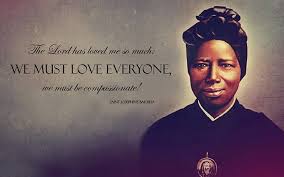The life and impact of St Josephine Bakhita.
Mrs Corkery, RE teacher reports that Lower VI, in their General RE lessons, are researching and writing about the issue of Human Trafficking, something which sadly is still of concern in today’s world.
Here Jasmine Dawuda, Ellie Kingsmill, Aoife Pedreschi and Sofia Gentile write about the life and impact of the modern saint, St Josephine Bakhita (c. 1869 – 1947).
‘As St Josephine Bakhita once said “If I were to meet the slave-traders who kidnapped me, I would kneel and kiss their hands … we must love everyone.” After being sold into slavery and being treated for many years with a lack of human identity, Bahkita was able to forgive her perpetrators and be an inspiration for those who remain voiceless, both at the time when she was alive and in today’s society.
Josephine Bakhita was born in Darfur around 1869 and was kidnapped and sold into slavery at a very young age, where she was forced to work in Italy. Whilst living through these terrible conditions, she found her strength in God and the Catholic Church. She became baptised and confirmed, demonstrating her companionship with God and how hope is always present even in the darkest times. The fact that after being forced to address so many people as ‘master’, she had the strength, and had reached the stage where she was happy to call God the same name is a perfect example of her nobility and dignity.
Despite her death being a tragic loss to humanity, it can be looked at in a positive light as she has been recognised for the hardships she endured and the bravery she showed through her lifetime by the Church as she was beatified and then canonized in 2000.
Furthermore, the Bakhita Foundation is a Catholic apostolate committed to ending sexual exploitation and helping survivors to find healing. They aim to achieve such goals by providing workshops at Catholic schools and parishes, training members of the community to identify red flags, promoting community awareness online, and providing support groups for family members of victims. The Catholic belief that human life is sacred from the moment of conception feeds in to the values of the Bakhita Foundation, as every human is made in the image and likeness of God. Furthermore, as the foundation believes men and women will only find true freedom in living their sexuality according to God’s design, they promote the virtues of purity and chastity and the sacredness of marriage between one man and one woman. Their greatest feat, however, still remains in their fight against the greater issue of sexual exploitation and trafficking, ‘And together we stand amazed, not at the darkness of the great evil in our midst but of the greatness of our God because, “a light shines in the darkness and the darkness shall not overcome it!”’ (John 1: 5)
Josephine Bakhita is an example of mercy and forgiveness and always having strength to be kind to others even when they have treated you badly. She forgave her kidnappers and ‘owners’ despite the abuse they put her through. She was known for her gentle voice and smile and was always charismatic. She, when talking about her enslavement, professed she would thank her kidnappers as had she not been kidnapped she would not have come to know Jesus. Even in her older years when she was forced to use a wheelchair owing to her physical pain, when asked how she was, would answer “As the master desires” which reminds people that whatever hardship they are facing it is possible to be positive and grateful rather than complaining.’
Categories: Faith Life Sixth Form Whole School




